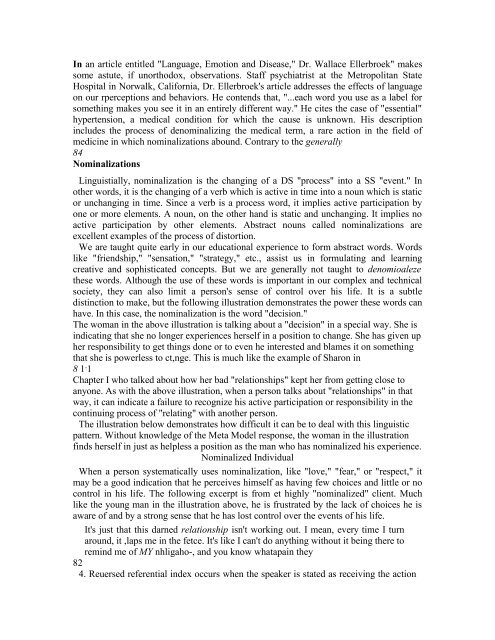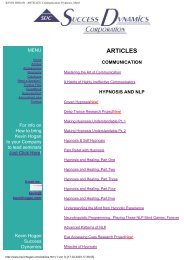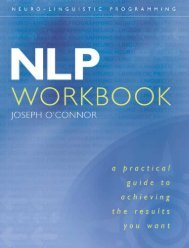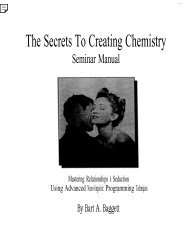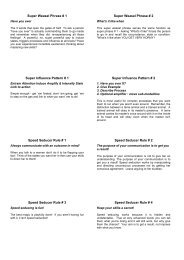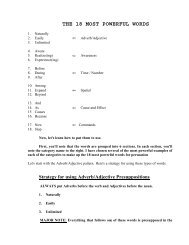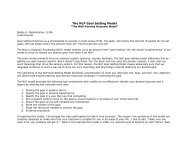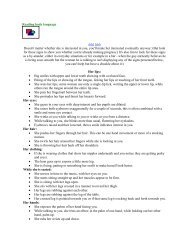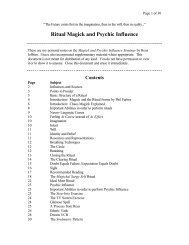A Pragmatic Guide To Communication & Change.pdf - NLP Info Centre
A Pragmatic Guide To Communication & Change.pdf - NLP Info Centre
A Pragmatic Guide To Communication & Change.pdf - NLP Info Centre
- No tags were found...
Create successful ePaper yourself
Turn your PDF publications into a flip-book with our unique Google optimized e-Paper software.
In an article entitled "Language, Emotion and Disease," Dr. Wallace Ellerbroek" makes<br />
some astute, if unorthodox, observations. Staff psychiatrist at the Metropolitan State<br />
Hospital in Norwalk, California, Dr. Ellerbroek's article addresses the effects of language<br />
on our rperceptions and behaviors. He contends that, "...each word you use as a label for<br />
something makes you see it in an entirely different way." He cites the case of "essential"<br />
hypertension, a medical condition for which the cause is unknown. His description<br />
includes the process of denominalizing the medical term, a rare action in the field of<br />
medicine in which nominalizations abound. Contrary to the generally<br />
84<br />
Nominalizations<br />
Linguistially, nominalization is the changing of a DS "process" into a SS "event." In<br />
other words, it is the changing of a verb which is active in time into a noun which is static<br />
or unchanging in time. Since a verb is a process word, it implies active participation by<br />
one or more elements. A noun, on the other hand is static and unchanging. It implies no<br />
active participation by other elements. Abstract nouns called nominalizations are<br />
excellent examples of the process of distortion.<br />
We are taught quite early in our educational experience to form abstract words. Words<br />
like "friendship," "sensation," "strategy," etc., assist us in formulating and learning<br />
creative and sophisticated concepts. But we are generally not taught to denomioaleze<br />
these words. Although the use of these words is important in our complex and technical<br />
society, they can also limit a person's sense of control over his life. It is a subtle<br />
distinction to make, but the following illustration demonstrates the power these words can<br />
have. In this case, the nominalization is the word "decision."<br />
The woman in the above illustration is talking about a "decision" in a special way. She is<br />
indicating that she no longer experiences herself in a position to change. She has given up<br />
her responsibility to get things done or to even he interested and blames it on something<br />
that she is powerless to ct,nge. This is much like the example of Sharon in<br />
8 1 - 1<br />
Chapter I who talked about how her bad "relationships" kept her from getting close to<br />
anyone. As with the above illustration, when a person talks about "relationships" in that<br />
way, it can indicate a failure to recognize his active participation or responsibility in the<br />
continuing process of "relating" with another person.<br />
The illustration below demonstrates how difficult it can be to deal with this linguistic<br />
pattern. Without knowledge of the Meta Model response, the woman in the illustration<br />
finds herself in just as helpless a position as the man who has nominalized his experience.<br />
Nominalized Individual<br />
When a person systematically uses nominalization, like "love," "fear," or "respect," it<br />
may be a good indication that he perceives himself as having few choices and little or no<br />
control in his life. The following excerpt is from et highly "nominalized" client. Much<br />
like the young man in the illustration above, he is frustrated by the lack of choices he is<br />
aware of and by a strong sense that he has lost control over the events of his life.<br />
It's just that this darned relationship isn't working out. I mean, every time I turn<br />
around, it ,laps me in the fetce. It's like I can't do anything without it being there to<br />
remind me of MY nhligaho-, and you know whatapain they<br />
82<br />
4. Reuersed referential index occurs when the speaker is stated as receiving the action


